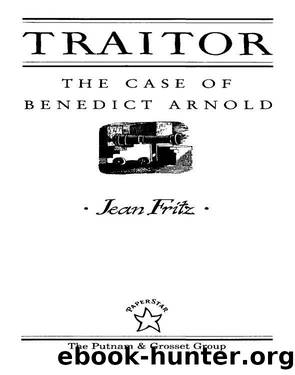Traitor by Jean Fritz

Author:Jean Fritz
Language: eng
Format: epub
Publisher: Penguin Young Readers Group
Published: 2010-02-26T00:00:00+00:00
chapter 8
PHILADELPHIA HAD CHANGED in the nine months of British occupation. Most of the Patriot residents had moved out when the British had moved in, leaving the city largely in the hands of Tories and of Quakers who, because of their peaceful religion, tried to be neutral. This was such a congenial atmosphere for the British that General Howe had decided heâd just settle down and have a good time. Besides, with New York and Philadelphia both in British hands, the war must be almost over, heâd thought, so why not enjoy himself? With his encouragement, Philadelphia suddenly turned into a center of social activityâballs, plays, dancing, parties. Had it not been for the number of British uniforms about, a stranger would hardly have guessed that this was a city at war with an enemy encamped just twenty-five miles away.
Among the many who enjoyed the pleasures of Philadelphia in the winter of 1777-78 were two young people whose names have survived in history only because of Benedict Arnold. Neither had met Arnold yet. In the midst of war they were playing an elaborate game of dress-up and their one object was to have fun.
Twenty-six-year-old British Major John André, who had been captured in the Canadian campaign, had recently been exchanged as a prisoner of war and was now an aide to General Charles Grey. André was a romantic young man who lived life as if he were performing roles on a stage. Before joining the army he and a select group of friends had met to read poetry aloud, to discuss beauty, to play music. They considered themselves more sensitive, more artistic, more refined than the common run of people. And indeed André was talented. He wrote poetry, painted portraits, played the flute, and enjoyed creating theatricals.
But André could play many roles. When required to take an active part as a soldier, he was proud of being a bloody one. Before coming to Philadelphia, he had, as aide to General Grey, participated in what the Americans called âthe Paoli Massacreâ in which two hundred American soldiers had been taken by surprise and bayoneted. Even the wounded, even those who had surrendered were cut down without mercy. This was General Greyâs style. Known as âNo-Flint Grey,â he was famous for preferring the bayonet to the gun and young Major André felt manly and heroic following in his commanderâs footsteps. The sensitivity he admired in polite society had no place for him on the battlefield. His ideal soldier performed without feeling, without remorse, without question and after the grisly massacre at Paoli, John André was happy to think that he had measured up. âI must be vain enough to tell you,â he wrote his mother, âthat he [Grey] seemed satisfied with my service.â There was only one thing lacking in his personal drama. If only he could be wounded! He didnât wish for a serious wound, he said. Just something he could brag about.
In Philadelphia, however, André, reverting to his society role,
Download
This site does not store any files on its server. We only index and link to content provided by other sites. Please contact the content providers to delete copyright contents if any and email us, we'll remove relevant links or contents immediately.
Among the Betrayed by Margaret Peterson Haddix(11612)
05 Trials of Death by Darren Shan(6440)
Ranger's Apprentice 1 - The Ruins of Gorlan by John Flanagan(5936)
The Power of Now: A Guide to Spiritual Enlightenment by Eckhart Tolle(5781)
Percy Jackson 1 - The Lightning Thief by Riordan Rick(4958)
Suicide Notes by Michael Thomas Ford(4827)
I'm Still Scared by Tomie dePaola(4384)
Pocahontas by Joseph Bruchac(4259)
The Book Thief by Markus Zusak(4154)
The miraculous journey of Edward Tulane by Kate DiCamillo(4125)
07 Hunters of the Dusk by Darren Shan(3762)
The 101 Dalmatians by Dodie Smith(3511)
The Science Book (Big Ideas Simply Explained) by DK(3286)
Harry Potter 4 - Harry Potter and The Goblet of Fire by J.K.Rowling(3073)
Winnie_The_Pooh by A. A. Milne(3038)
The Little Prince by Antoine de Saint-Exupéry(2877)
0041152001443424520 .pdf by Unknown(2845)
The Ring of Sky by Chris Bradford(2838)
The Wrath and the Dawn by Ahdieh Renee(2757)
